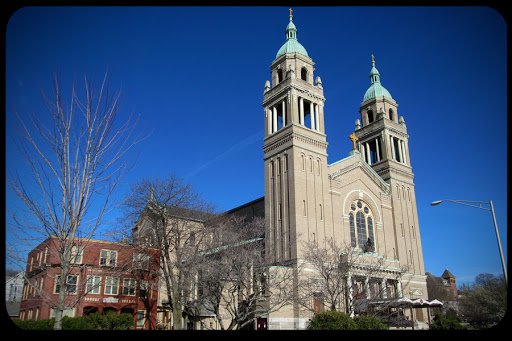A few weeks ago my wife and I drove from one end of Rhode Island to the other, from our hometown of Newport in the south to the city of Woonsocket in the north. This trip can be accomplished in little more than an hour while obeying speed limits.
We took the trip because we wanted to see a magnificent Catholic church, St. Anne’s — a church that is no longer a church because it has been de-sanctified or de-consecrated (or whatever the proper description is for an old church that has been religiously de-commissioned).
The church was built about 100 years ago, but it ceased to be a church about the year 2000 because the number of church-goers had declined (as Catholic church-goers in the once very Catholic state of Rhode Island have declined generally), and the cost of keeping the building had gone up. St. Anne parish was merged with another parish, and the building was slated for demolition. Fortunately, however, the building was saved as a museum and artistic center by a secular organization that has raised upkeep money and provides guided tours of the old church.
It’s a magnificent building, majestic-looking from the outside and marvelous on the inside for its stained-glass windows and, above all, its multitudinous frescos done in the 1940s by an artist from Florence, Italy.
It was a French-Canadian parish, built (as our guide accurately said) with the “nickels and dimes” of its parishioners. And who were these parishioners? They were immigrants, or the sons and daughters of immigrants, from Quebec. These were not rich people — just the opposite. Woonsocket is an old factory city that once abounded in mills directly involved in, or closely connected with, the textile industry that still flourished in New England a century ago. These immigrants were lowly paid mill workers. They lived in multi-family houses that contained anything from three to eight tenements; they could afford nothing better.
Many of these tenement houses are still standing today in the neighborhood of the church — even though they are no longer often occupied by persons of French-Canadian stock, for the descendents of the old Quebec immigrants have made a few dollars in America and moved into better neighborhoods, often outside of Woonsocket.
I marveled at all this. These old mill workers lived on the edge of poverty in their private lives, indulging in few if any luxuries; but when it came to their church life, they would have nothing but the best. Their poor tenements might be shabby, but they would have nothing less than a magnificent church. Very probably they had little in the way of personal pride. After all, what could they boast of? They had little schooling, hardly any money, no fame, and only minimum comforts in life. But they had pride in their religious-ethnic community.
Everybody recognizes that it is psychologically important that a person have pride. And so we tell kids that they must be proud of themselves; we try to boost their self-esteem by telling them to be pleased with themselves as individuals. This, I suspect, is very wrong-headed. Look at those old French-Canadian mill workers. They weren’t proud of themselves as individuals. They were proud of being French-Canadian Catholics. And so they built St. Anne church as, among other things, a visible symbol of their pride.
Isn’t it better to be proud of our community, especially when it is a sacred community, than to be proud of ourselves? When the Catholic Church teaches, as it has always taught, that pride is a sin, isn’t it individual pride that is meant? The Church isn’t telling us it is sinful to be proud of our membership in either the worldwide Catholic community or the local parish community. But it is a sin to be proud of my petty individual self.
Besides, look what happens when we encourage kids to be proud of their individual selves. Not only do they become egoists, but often they become eccentric egoists. Sometimes their eccentricity makes them amusing and foolish egoists, as when, to show that they are “different” from the common run of human beings, they cover their bodies in tattoos, or stick rings through their noses and lips, or make big holes in their earlobes. And sometimes their eccentricity is dangerous, as when they do drugs, or engage in crime, or experiment with unnatural sexual behavior, or decide that they are trapped in the body of a sex other than their true sex.
If we find that we have no choice but to encourage kids to be proud of their individual selves instead of being proud of some moral community, this is because our modern societies have grown less communitarian and more individualistic. We are so in love with the ideas of individualism and personal freedom that we allow our moral communities — especially our religious communities — to wither. Soon, if we are not careful, they will wither away completely, and our luckless kids will have to make their way in a howling wilderness of moral anarchy.
Those old and nearly impoverished French-Canadian mill workers were wiser than we prosperous latter-day Americans.
David Carlin, a professor of sociology and philosophy at the Community College of Rhode Island at Newport, is the author of The Decline and Fall of the Catholic Church in America.

